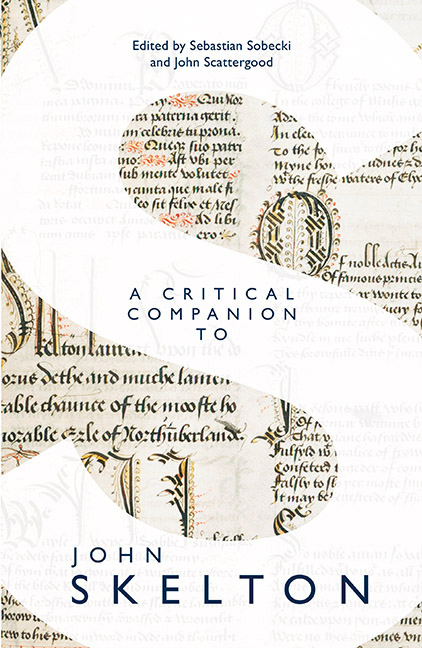Book contents
- Frontmatter
- Dedication
- Contents
- Acknowledgements
- Contributors
- Abbreviations
- Conventions
- Introduction
- 1 John Skelton (?1460–1529): A Life in Writing
- 2 Religion
- 3 Law and Politics
- 4 Classical Literature
- 5 Humanism
- 6 Satires and Invectives
- 7 Lyrics and Short Poems
- 8 Skelton's Voice and Performance
- 9 Literary Tradition
- 10 Skelton and the English Language
- 11 Skelton's English Works in Manuscripts and Print
- 12 Skelton's English Canon
- 13 Reception and Afterlife
- A Skelton Bibliography
- Index of Manuscripts
- Index of Printers and Stationers
- General Index
9 - Literary Tradition
Published online by Cambridge University Press: 24 July 2019
- Frontmatter
- Dedication
- Contents
- Acknowledgements
- Contributors
- Abbreviations
- Conventions
- Introduction
- 1 John Skelton (?1460–1529): A Life in Writing
- 2 Religion
- 3 Law and Politics
- 4 Classical Literature
- 5 Humanism
- 6 Satires and Invectives
- 7 Lyrics and Short Poems
- 8 Skelton's Voice and Performance
- 9 Literary Tradition
- 10 Skelton and the English Language
- 11 Skelton's English Works in Manuscripts and Print
- 12 Skelton's English Canon
- 13 Reception and Afterlife
- A Skelton Bibliography
- Index of Manuscripts
- Index of Printers and Stationers
- General Index
Summary
Skelton's writing has long been understood as a mix of conventional and idiosyncratic elements. It draws on numerous established motifs, genres and poetic traditions: his earliest known works show him experimenting with lyric, with elegy and with an aureate style derived from Lydgate; his many invectives draw on the conventions of the flyting; his surviving dramatic work shows him adapting the form of the morality play to secular ends; the satires of the 1520s fuse bitter Juvenalian satire with native complaint; his dream visions place him in a Chaucerian tradition; his impassioned claim to divine inspiration in his final poem, A Replycacion (1528), can be linked to earlier Continental defences of poetry, most notably Boccaccio's in his De genealogia deorum gentilium. Even the most ostentatiously peculiar aspect of his writing, the skeltonic verse form, with its short lines and irregular rhyme leashes, has demonstrable connections to existing genres, among them alliterative Latin prose and Middle English lyric. Taking as its starting-point the neglected poem Against Venemous Tongues (c. 1516), this chapter will explore a range of ways in which literary traditions manifest in Skelton's work, ranging from playful allusion and rhetorical self-fashioning to fully assimilated and internalised influence on Skelton's composition techniques.
Against Venemous Tongues is a relatively short and strikingly odd poem. Whilst it is clearly an attack on slanderers, its occasion remains obscure: Skelton defends himself against a charge which is never fully specified, but which may have been that he criticised one or more lords for the number of servants wearing their liveries at a ceremonial meeting between Henry VIII and his sister Margaret in the spring of 1516; since a household livery was a kind of uniform, a visual statement of the household to which someone belonged, a display of numbers amounted to an assertion of power. The crux of Skelton's defence, that the accusation levelled against him is untrue, occupies a very few lines, and is notably slippery:
For before on your brest, and behind on your back
In Romaine letters I never founde lack.
(16–17)Although the primary sense of to ‘find lack’ is ‘to find fault with’, there is a pun on the sense ‘to find wanting’ or ‘to find to be too few’; even as he claims not to have said that there were too many people in livery, Skelton implies that there were plenty of them, nonetheless.
- Type
- Chapter
- Information
- A Critical Companion to John Skelton , pp. 127 - 138Publisher: Boydell & BrewerPrint publication year: 2018



